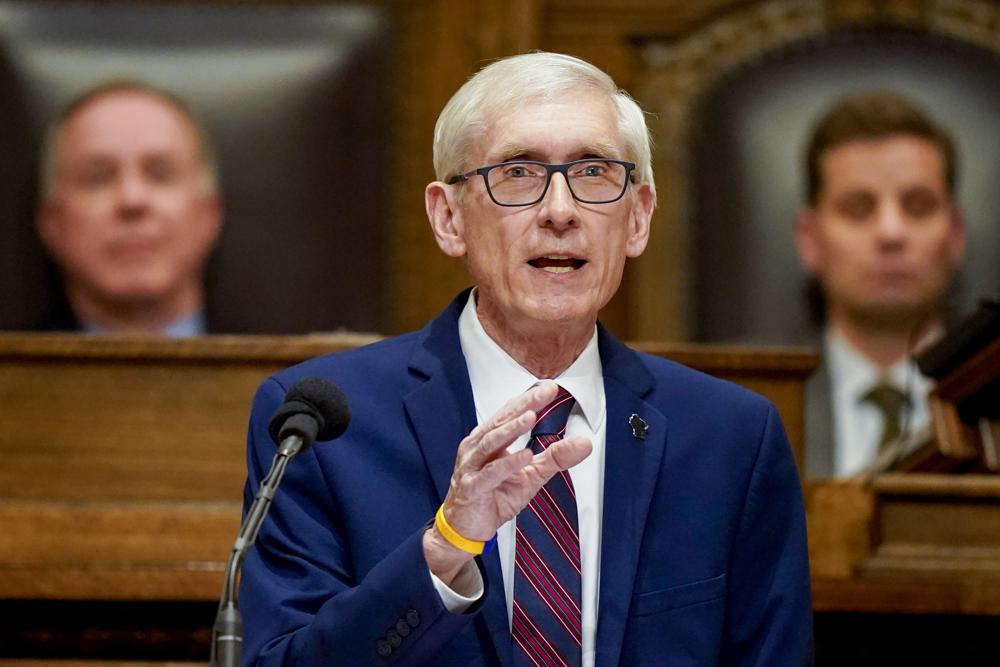Politics
In State of State address, Wisconsin Gov. Evers calls on Legislature to approve $150 taxpayer refund

MADISON, Wis. (AP) — Gov. Tony Evers used his election year State of the State address on Tuesday to call on the Republican-controlled Legislature to approve his plan to send $150 to every taxpayer in Wisconsin, saying inaction by lawmakers now while people are suffering is “baloney.”
Republicans reiterated after the speech that the plan is dead on arrival and the special session Evers announced Tuesday will almost certainly come and go without the Democratic governor getting what he wants, much like others he has called over the past three years.
Evers also announced that he was tapping $25 million in federal pandemic relief money to pay for continuing a tuition freeze at the University of Wisconsin System for another year. The Legislature lifted the tuition freeze for this year, but the UW Board of Regents opted not to raise tuition. Evers is providing funding to pay for the current freeze and another year, the 2022-2023 school year.
Evers also announced plans to use federal money to pay for mental health services at K-12 schools, UW and for Wisconsin National Guard members and to fund emergency services, particularly in rural areas.
Evers, who gave his speech virtually last year just before the COVID-19 vaccine was readily available to the public, delivered this year’s address where it has traditionally been made: before lawmakers, members of the state Supreme Court, other elected officials and invited guests in the Assembly chamber.
The address was about a month later than normal and came as the Legislature prepares to end its biennial session in three weeks.
Evers called on lawmakers to approve his plan for spending $1.7 billion of the state’s projected $3.8 billion surplus. Evers wants to send $150 refund checks to every Wisconsin resident, increase a child care tax credit and send $750 million toward K-12 schools and higher education.
Then-Gov. Scott Walker, a Republican, sent refund checks to taxpayers in 2018 when he faced reelection. Republicans supported the idea then, but they don’t now. Evers opposed it then but likes it now, arguing that the circumstances are different as the state emerges from the pandemic.
“If Governor Evers didn’t steal Republican ideas, he wouldn’t have much of a speech at all,” Republican Sen. Alberta Darling said following his address.
Republicans want to wait until next year when they hope there is a new governor before spending any of the surplus. Evers argued against that.
“That’s not going to help Wisconsinites buy groceries today,” he said. “It won’t help Wisconsinites pay for gas today. It won’t help Wisconsinites pay for childcare, heat their homes, or put food on their table today. Wisconsinites can’t wait.”
Evers told lawmakers not “sit here in a white, marble building with state coffers that are full and tell Wisconsinites who are working hard every day that we can’t afford to do more. That’s baloney.”
But Assembly Speaker Robin Vos promised that “Republicans will continue to block Governor Evers’ liberal agenda.”
Evers announced that he was using federal pandemic relief funds to spend $15 million toward mental health programs for K-12 students and $5 million for mental health services for UW students.
Evers also announced he was spending $30 million in federal relief funds on supporting emergency medical service providers and services statewide, with two-thirds of that targeting rural areas. He’s also creating a new commission to recommend ways to support veterans in Wisconsin.
Evers and the Republican legislators have found little common ground over the past three years. Evers rarely meets with GOP leaders and Republicans are advancing a conservative agenda that they know Evers will veto but that will give them fodder to use on the campaign trail.
But Evers has been able to get around the Legislature with the allocation of the federal pandemic money, which he can direct outside of their control.
In areas where the governor and lawmakers have come together, such as the two state budgets Evers signed into law, they have squabbled over who can take credit. For example, Evers has been touting the $2 billion income tax cut he signed as part of the last budget, even though that was written by Republicans who rejected his calls to raise taxes on the wealthy and corporations.
When Evers gave the speech virtually last year — a first in Wisconsin history — just over 5,000 people had died in the state from COVID-19. As of Tuesday, the state death toll was more than double that, at over 11,600. But as the omicron wave began to rapidly drop, Evers decided to return to an in-person speech before a Legislature that opposed his efforts to slow the spread of the virus, including his statewide mask mandate.
Evers announced that he was spending $5 million on expanding access to mental health and wellness support for Wisconsin National Guard troops. He recognized them for their work during the pandemic the past two years, helping to staff election polling sites early in the pandemic, working at COVID-19 testing sites, delivering protective gear and helping to vaccinate people.

